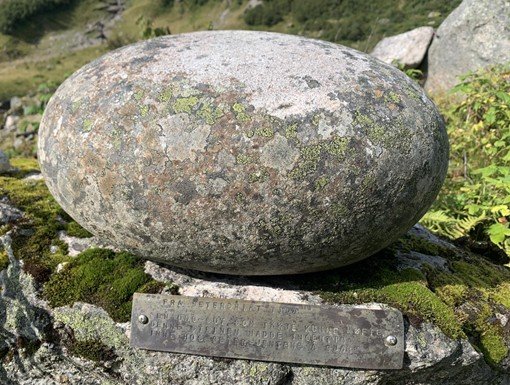Hike to Stol
The summer farm Stol is beautifully located on a ridge deep in Glomsdalen. It is about 9 km to walk from the car park and 650 meters in altitude. You should allow eight and a half hours for the entire hike.
Difficulty: Demanding. This hike requires good physical fitness and experience with walking on uneven terrain.
Length: 9km one way.
Elevation gain: 650m
Duration: 8,5 hours round trip
Season: Summer and autumn
Parking: You can park at the parking lot located about 200 meters from the Glomnes farm. Please remember to pay the fee
Note: The hike is in an area with no cellular coverage, please download the PDF with hike description before leaving. Early in the summer, it is common to encounter snowfields across the valley at Utfalla.
Hike description
The summer farm Stol is beautifully located on a ridge deep in Glomsdalen. It is about 9 km to walk from the car park and 650 meters in altitude. You should allow eight and a half hours for the entire hike.
This is a hike that requires good physical fitness and experience in walking on rough terrain.
On the way to Stol (680 masl.) you pass two summer farms, Glomnessetra (400 masl.) and Midtstøylen (620 masl.)
Early in summer, it is common that a huge amount of snow from avalanches lies across the valley at Utfalla.
You can park at the car park 200 meters from the Glomnes farm for a fee.
Right by the car park, you go through a gate that leads into an enclosure for sheep. You go on through yet another gate and follow the path along the fence until you turn 90 degrees to the right up a hill. Here it is relatively steep and winding all the way to Kvilefloten. See the map.
The path further from Kvilefloten meanders easily upwards to Glomnessetra. Here you pass two cabins that have been erected in recent times and an old stone cabin that is destroyed by the test of time.
You will first pass an old cabin built of stone. The roof is gone and the house is falling apart. Then you will see two cabins built in recent times.
The Glomnes summer farm had an enclosure. They cut the grass, dried it and carried it on their back to Kvilefloten. From there they sent it on a zip-wire to Glomnes.
Milking at Glomnessetra and Segestadsetra ended in 1950. They stopped cutting the grass here just before that time.
The path continues with a gentle ascent into the valley. After about 2 kilometers you can see Nos/Bolstadsetra on a ridge on the other side of the river.
After you have passed Nos, it is not far to Utfalla. Here, there are large avalanches in winter and the snow can be lying well into the summer. Bear in mind that the stream melts the snow from underneath, and it can be unsafe to pass. Be careful!
There is a simple, small bridge across Tverrelva. This is put aside every autumn so that avalanches cannot destroy it.
On Midtstøylen a cabin has been built that has a special protection against avalanches.
In older times, there were many cabins down by the river up here. It was Hjelle's summer farm. Today only a few ruins remain.
When you pass Midtstøylen, you will see Stol on a ridge further ahead. Then there is barely 1.5 kilometers to walk.
If you have the energy for it, you are welcome to walk a short quarter of an hour further towards Stolsbotnen. Close to the path there is a flat rock with many bowl pits. These bowl pits may date from the Bronze Age (1800-500 BC) and were probably used during religious rituals. The bowl pits are approx. 5 cm in diameter.
Remember that there are sheep grazing. The dog must go on a leash. Show consideration and shut all the gates on your way!
The summer farm cabins at Stol in 1950
The image and illustration above are taken from the book “Setrar i Oppstryn og Nedstryn” by Kjell Råd

The car park at Glomnes. Please remember to pay the fee.

On the way to Kvilefloten you can see straight down to Glomnes.

Kvilesteinen (a stone) on Kvilefloten. The stone is flat and good to sit on as it is a suitable height. The path up Glomneskleiva (from Glomnes to Kvilefloten) is steep, and it might be nice to have a rest here.

Glomnessetra.

Some distance past Glomnessetra, you pass this stone. Here it says: "The young man who could not lift this stone had no chance with the girls at the summer farm."

We can see Nos/Bolstadsetra on the other side of the river.

The cabins at Nos (Bolstadsetra)

Utfalla. Here there is often snow lying from avalanches across the valley in the middle of summer. Bear in mind that the stream melts the snow from underneath, and it can be unsafe to pass. Be careful!

The picture was taken just in front of Utfalla. We see Skåla (1848 masl.) and Storskredfjellet (1815 masl.) in the background.

We are approaching the Tverrelva river (Bornielva).

The cabin at Midtstøylen

Midtstolskaret. Rinddalshyrna (1677 masl.) in the background

View from Midtstøylen towards Stolsbotnen.

Stolsbakken. The cabins at Stol stand on the hilltop.

The summer farm with a view back over the valley

2000 - memorial This stone came tumbling down the moun- tainside just before the year 2000 and be- came a thousand-year memorial. The stone is standing not far from the cabins at Stol.





